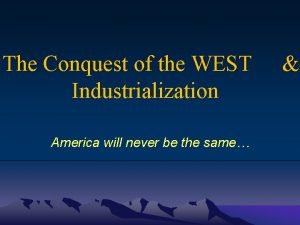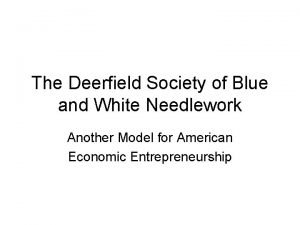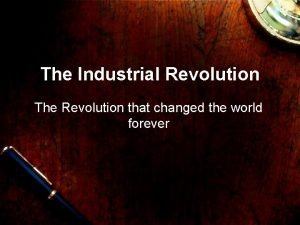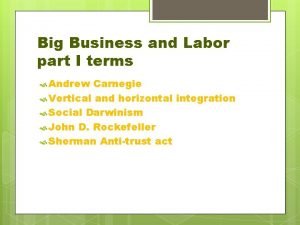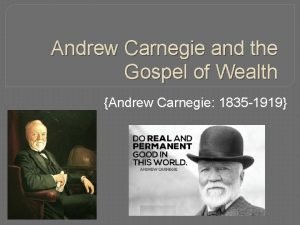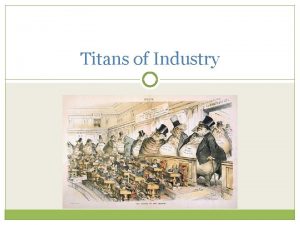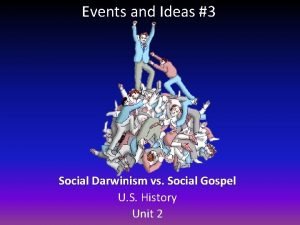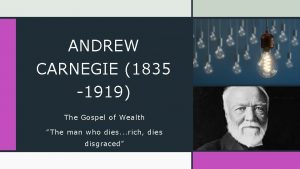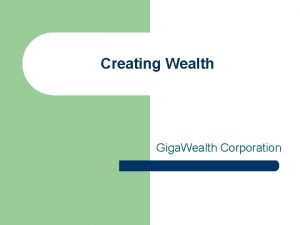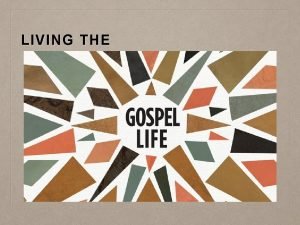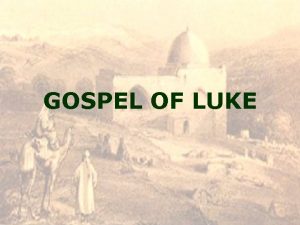Andrew Carnegie and the Gospel of Wealth Andrew











- Slides: 11

Andrew Carnegie and the Gospel of Wealth {Andrew Carnegie: 1835 -1919}

Early Life �Andrew Carnegie was born in Scotland in 1835 and emigrated to America with his family in 1848. �His family was very poor and was supported by his mother, which motived Carnegie to be successful. �Carnegie had little formal schooling and was a self-educated man.

Early Career � Carnegie began working for the Pennsylvania Railroad in 1853 and quickly realized the importance of iron and steel for the future of the American economy � Carnegie’s early business ventures were focused on investments and vertical integration, specifically in the steel industry. � Most industrialists at the time made their profits by creating a horizontal monopoly.

Vertical vs. Horizontal Integration

Vertical vs. Horizontal Integration � � VERTICAL Allows a company to: � � • Strengthen its supply chain • Reduce production costs • Capture upstream or • • • downstream profits • Access downstream distribution markets One company acquires another company that is either before or after it in the supply chain process � Ex: Nike (shoe production and design company) opening a retail store � HORIZONTAL Allows a company to: Increase its size Diversify its product or service Achieve economies of scale Reduce competition Gain access to new customers or markets Usually involves the merger or consolidation of two companies in the same industry � Ex: Disney acquiring Pixar �

Standard Oil Published in 1904 in Puck magazine � The only thing not under control of the octopus is the White House (horizontal integration). � Shipping State Capital Building Congress Railroads White House Business Owners, Politicians

Carnegie Steel Company � The Carnegie Steel Company revolutionized steel production in the United States. Carnegie built plants around the country using technology and methods that made manufacturing steel easier, faster and more productive. � For every step of the process, he owned exactly what he needed: the raw materials, ships and railroads for transporting the goods, and even coal fields to fuel the steel furnaces. � This start-to-finish strategy helped Carnegie become the dominant force in the industry and an exceedingly wealthy man.

Homestead Strike � Carnegie Steel was accused of making such great profits by taking advantage of its workers. � When the company tried to lower wages at a Carnegie Steel plant in Homestead, PA, employees refused to work, starting the Homestead Strike of 1892. � The conflict between the workers and local managers turned violent after the managers called in guards to break up the union. � Carnegie was in Scotland at the time of strike, but many still held him accountable for his managers' actions.

Philanthropy � In 1901, Carnegie sold his business to the United States Steel Corporation, started by legendary financier J. P. Morgan. The sale earned him more than $200 million. � At the age of 65, Carnegie decided to spend the rest of his days helping others. While he had begun his philanthropic work years earlier by building libraries and making donations, Carnegie expanded his efforts in the early 20 th century. � Carnegie is best known for the nearly 3, 000 public libraries he helped build. By the time he died in 1919, he is believed to have given away over $350 million.

Carnegie’s Life Philosophy �To spend the first third of one's life getting all the education one can. �To spend the next third making all the money one can. �To spend the last third giving it all away for worthwhile causes.

The Gospel of Wealth �What is Andrew Carnegie’s “Gospel of Wealth”? �Article written by Carnegie in 1889 �See excerpts
 Gospel of wealth apush definition
Gospel of wealth apush definition Stock watering definition apush
Stock watering definition apush Carnegie and rockefeller venn diagram
Carnegie and rockefeller venn diagram Was andrew carnegie a hero
Was andrew carnegie a hero Robber barons and rebels
Robber barons and rebels Was andrew carnegie bad
Was andrew carnegie bad Andrew carnegie vertical integration
Andrew carnegie vertical integration Andrew carnegie vertical integration
Andrew carnegie vertical integration Philanthropy carnegie
Philanthropy carnegie Spend bll gates money
Spend bll gates money Rockefeller vertical integration
Rockefeller vertical integration Social darwinism paralleled the economic doctrine of
Social darwinism paralleled the economic doctrine of
